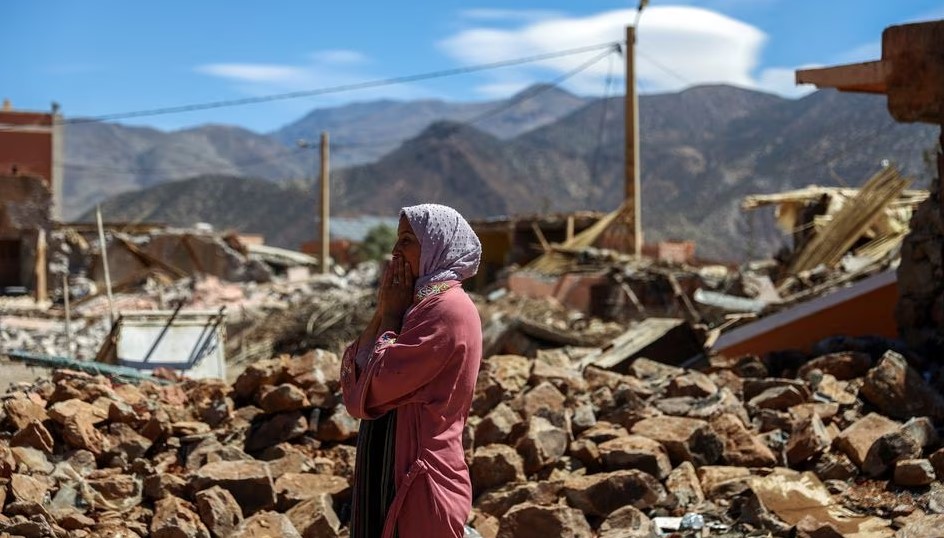Morocco: The death toll from the 6.8 magnitude earthquake that struck in the High Atlas Mountains late on Friday, September 7, 2023, has risen to 2,901, while the number of people injured has doubled to 5,530, state television reported.
According to Reuters, it was the North African country’s deadliest earthquake since 1960 and its most powerful in more than a century.
Rescuers from Spain, Britain and Qatar were helping Morocco’s search teams, while Italy, Belgium, France and Germany said their offers of assistance had yet to be approved.
The situation was most desperate for people in remote areas cut off by landslides triggered by the earthquake that blocked access roads. At the same time, inaccessible locations relief efforts were stepped up with tent camps and distribution of food and water.
Libya: On Wednesday, the Eastern Libyan city of Derna counted its dead in thousands and feared a very heavy toll after two dams broke under the pressure of torrential rains, releasing powerful floodwaters that swept away everything in their path.
Given the difficult access to this town of 100,000 inhabitants, uncertainties remain over the number of victims of the disaster, which could have left several thousand people dead or missing, according to the authorities.
AFP reports that roads were cut off, and landslides and floods prevented rescue services from reaching the population, who had to make do with rudimentary means to recover bodies buried by the dozen in mass graves, according to images broadcast on social networks.
Derna and other towns are virtually cut off from the rest of the world despite efforts by the authorities to restore cell phone and internet networks.
Zimbabwe: There is palpable outrage in Zimbabwe as President Emmerson Mnangagwa names his son David Kudakwashe Mnangagwa as deputy Finance Minister as part of the parliament’s youth quota.
President Emmerson Mnangagwa is accused of nepotism after appointing one of his sons as one of a new set of Ministers following his controversial re-election last month.
Local media reported that he also appointed his nephew, Tongai Mnangagwa, the deputy tourism minister.
The BBC said Mthuli Ncube, an ex-banker, was retained as the Finance Minister. At the same time, the ruling Zanu-PF party’s national Chairperson, Oppah Muchinguri-Kashiri, was re-appointed as the defence minister.
Outspoken main opposition – Citizens Coalition for Change or CCC lawmaker Fadzayi Mahere termed the new ministerial line-up as “indefensible” and accused Mr Mnangagwa of stoking nepotism.
Some social media users have been expressing disappointment with the appointment.
There has been no official reaction from the ruling party or the presidency over the accusation. However, supporters of Mr Mnangagwa say his son is qualified for the position.
Mr Mnangagwa’s re-election has been disputed by the opposition, citing claims of fraud, while some observers said the poll failed to meet regional and international standards.
Tunisia: Three children and one woman have reportedly died, and 21 people were rescued after their migrant ship sank off the Tunisian city of Sfax, Faouzi Masmoudi, a judge in Sfax, told Reuters on Wednesday.
He said all the migrants were Tunisians.
Tunisia has become a major departure point for migrant boats heading across the Mediterranean Sea towards Italy.
Niger Coup: The junta in Niger has said it would end a military pact with neighbouring Benin, accusing it of authorising the deployment of troops on its territory for a possible military intervention against Niger by the West African regional bloc.
The Economic Community Of West African States or ECOWAS bloc is trying to negotiate with the leaders of the July 26 Niger coup but has said if diplomatic efforts fail, it is ready to use force as a last resort to restore constitutional order and reverse the putsch.
Reuters reports that the junta, in a statement read on national television, said Benin had “authorized the deployment of soldiers, mercenaries, and war materials” in the context of the possible ECOWAS intervention.
As a result, the new Nigerien authorities “decided to renounce the military cooperation agreement (with Benin),” though there was no immediate response from Benin.
Recall that Nigerian President Bola Tinubu, who holds ECOWAS’ revolving Chairmanship, has suggested that a nine-month transition back to civilian rule could satisfy regional powers. Niger’s junta has previously proposed a three-year timeline.
Morocco: The earthquake that struck the High Atlas Mountains in Morocco on September 7, 2023, has resulted in 2,901 deaths and 5,530 injuries, making it the deadliest since 1960. International teams from Spain, Britain, Qatar, and other countries are aiding rescue efforts, hindered by landslides blocking access to remote areas.
Libya: The Eastern Libyan city of Derna faces a crisis after two dams broke due to torrential rains, causing devastating floods that claimed thousands of lives. Rescue operations are challenged by damaged infrastructure and communication networks.
Zimbabwe: President Emmerson Mnangagwa's appointment of his son as deputy Finance Minister has sparked accusations of nepotism. The opposition condemns the new ministerial appointments following disputed elections, while the ruling party defends the qualifications of Mnangagwa's son.
Tunisia: A migrant ship sank near Sfax, resulting in the deaths of three children and one woman, with 21 survivors. Sfax is a significant departure point for migrants attempting to reach Italy via the Mediterranean Sea.
Niger Coup: The junta in Niger has ended a military pact with Benin, accusing it of allowing potential intervention by ECOWAS. Negotiations are ongoing, but ECOWAS warns of possible military action if diplomacy fails to restore constitutional order.






